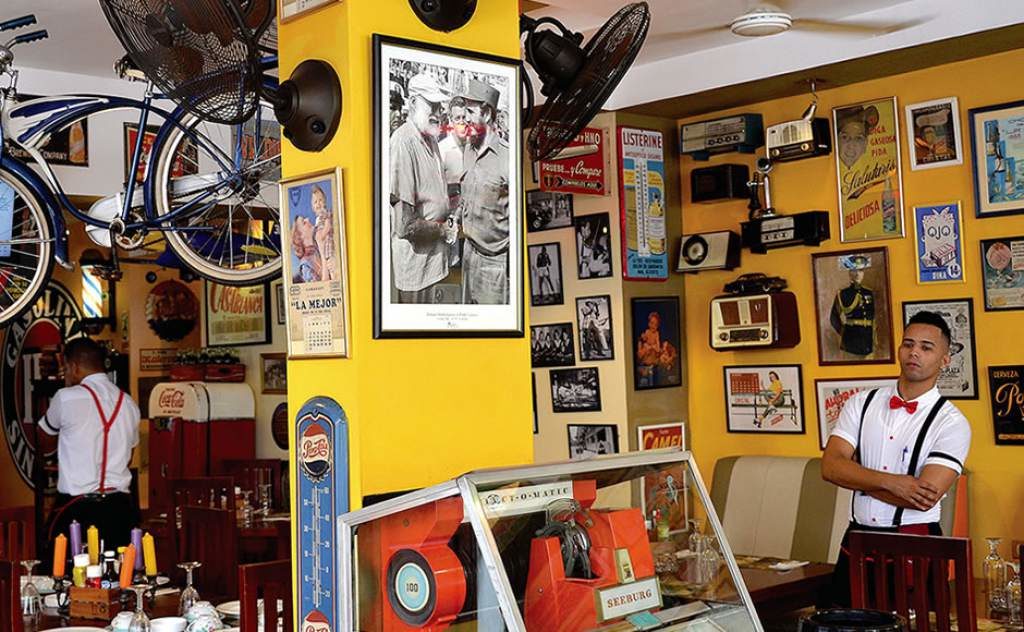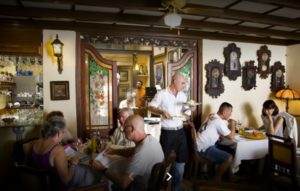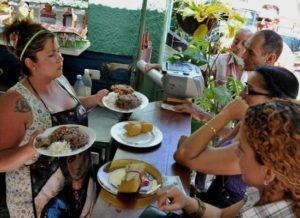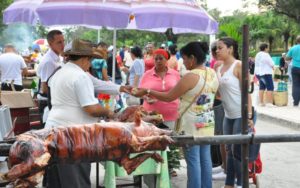 SECTOR PRIVADO EN CUBA CONVENCE AL GOBIERNO EN MODIFICAR REGLAS.
SECTOR PRIVADO EN CUBA CONVENCE AL GOBIERNO EN MODIFICAR REGLAS.
El Gobierno publicó este miércoles, a través de la Gaceta Oficial Extraordinaria número 77, modificaciones a las nuevas reglas para el sector privado en Cuba que entrarán en vigor el próximo 7 de diciembre.
Según un resumen de la Mesa Redonda de la televisión estatal recogido por el sitio oficial Cubadebate, “se trata de cambios que responden a las propias solicitudes de quienes laboran en esta forma de gestión, y también a la necesidad de lograr una ‘mejor aplicación’ de las medidas”.
Margarita González Fernández, ministra de Trabajo y Seguridad Social (MTSS), presentó los ajustes como “la voluntad del Gobierno cubano de continuar impulsando esa actividad como parte del proceso de actualización del modelo económico del país”.
Fernández informó que al cierre del mes de octubre había 588.000 trabajadores a los que el Gobierno llama eufemísticamente “cuentapropistas”. La cifra representa el 13% de los ocupados en la Isla, añadió.
“El TPCP es una modalidad de empleo, incrementa la oferta de bienes y servicios con niveles de calidad aceptables para la población y el turismo internacional, y sus tributos constituyen una fuente de ingreso para los presupuestos municipales”, defendió.
Las personas naturales pueden ser autorizadas a ejercer más de una actividad, siempre que cumplan lo regulado para el ejercicio del trabajo por cuenta propia. Las nuevas regulaciones establecían en principio que solo se otorgaría permiso para ejercer una sola actividad por persona.
“Este fue precisamente uno de los mayores pedidos durante los seminarios efectuados en todo el país”, argumentó la ministra.
La nueva disposición se ajusta al propio Código laboral cubano que contempla la posibilidad del pluriempleo.
No obstante, el cuentapropista tiene que participar cotidianamente en su negocio, mientras que la prohibición se aplicará en aquellas labores que por su naturaleza no pueden ejecutarse en el mismo espacio de tiempo, aclaró González.
En segundo lugar, se elimina el límite de 50 capacidades en las actividades de servicio gastronómico en cafetería, en restaurante, y en la de bar y recreación. El “tope” ahora será establecido por las propias características de los locales.
Como tercera modificación se reduce de tres a dos cuotas mensuales tributarias la cuantía del saldo mínimo que debe mantener la cuenta bancaria fiscal, a abrirse en CUP, por los titulares de licencias en las seis actividades obligadas a ello. Además, se incrementa de un 20% a un 35% el fondo de efectivo para pagos menores e imprevistos no obligado a depositar en dicha cuenta bancaria fiscal.
Según explicó Meisi Bolaños, viceministra de Finanzas y Precios, el titular deberá depositar el 65% de sus ingresos, con base a lo entregado en el mes anterior.
De las 123 actividades autorizadas, solo en seis se debe habilitar por el momento esta cuenta bancaria, lo que implica a alrededor de 80.000 contribuyentes (el 13% del total): servicio gastronómico en restaurantes, en cafetería, bar y recreación; arrendador de vivienda, habitaciones y espacios; servicios de construcción, reparación y mantenimiento de inmuebles, y los transportistas privados en La Habana que posean vehículos de cuatro a 14 capacidades.
Un cuarto cambio, en la actividad pandero-dulcero, el Gobierno decidió permitir la venta de bebidas no alcohólicas (incluyendo la cerveza).
Esta actividad se ejercía anteriormente a tenor con las actividades de las modalidades de alimentos, donde sí podían hacerlo y en el nuevo alcance de la actividad no se precisó explícitamente.
Desde este 7 de diciembre se comienzan a otorgar nuevas autorizaciones en 26 de las 27 actividades que estaban suspendidas. Quedaría pendiente la limitación para el programador de equipos de cómputos, hasta tanto se concluyan las normativas correspondientes para su funcionamiento por parte del Ministerio de Comunicaciones.
La titular del MTSS adelantó que, además, se encuentra en análisis otro grupo de aspectos que serán aprobados en siguientes etapas, y que presentó “con el seguimiento constante al perfeccionamiento del cuentapropismo”.
La viceministra primera del Ministerio de Trabajo y Seguridad Social Martha Elena Feitó respondió en el programa oficial a lo que el moderador Randy Alonso “dudas o matrices de opinión negativas sin fundamento real en las normas”.
Feitó dijo que la creación de la actividad servicio de bar y recreación no elimina el área de bar de los restaurantes asociado al servicio gastronómico que presta. (Es el mismo formato de restaurantes que tiene el sector estatal).
Por otra parte, el arrendador de viviendas y habitaciones puede brindar servicio de alimentación, incluida la oferta de bebidas alcohólicas o no. (Se incluye desayuno, almuerzo, comida). En estos casos la precisión requiere de licencia sanitaria.
Dijo que el arrendador de espacios no tiene que ser el titular de la actividad que se ejerce en ese espacio, este lo que hace es arrendar el local a otro trabajador por cuenta propia (Ejemplo: peluquería).
En cuanto al asistente para la atención educativa y el cuidado de niños, afirmó que “no hay límites de la cantidad de niños a cuidar, el límite lo determina el local en correspondencia con la capacidad que tenga a razón de dos metros cuadrados por niño; cada asistente social debe atender hasta seis infantes, en el entendido de la titular y de los trabajadores contratados. (Es lo establecido también en el sector estatal).
Dijo que las actividades que se encuentran definitivamente limitadas son carretillero, vendedor mayorista y minorista de productos agropecuarios, vendedores de disco y operador de equipos de recreación de fabricación rústica. Todos los que ya poseen estas licencias podrán continuar ejerciéndolas.
En cuanto a los horarios de trabajo, la funcionaria explicó que “los establecimientos para la producción y prestación de servicios tienen establecidos horarios de trabajo en correspondencia con las normas jurídicas, los cuales deben ser aprobados caso a caso por la administración municipal. Lo que se controlará es que funcionen dentro de la legalidad”.
Vladimir Regueiro Ale, director de Política Fiscal del Ministerio de Finanzas y Precios, recordó que a partir de la reorganización y unificación de diversas actividades del sector privado se establecen algunos cambios en el pago de los tributos.
De las 96 actividades que se unifican, dos pasan del Régimen General al Régimen Simplificado de Tributación; 11 pasan del Régimen Simplificado al General; 83 actividades se mantienen en el régimen actual.
El funcionario precisó que en aquellas actividades que se unifican y los propietarios de licencias pagan en la actualidad una cuota mensual superior a la que se fija como mínima para la nueva actividad unificada, se mantendrán pagando la cuota anterior, habida cuenta de que la misma responde al nivel de actividad e ingresos que le ha sido verificada anteriormente al titular de esa licencia.
 PRIVATE SECTOR IN CUBA PERSUADES THE GOVERNMENT TO MODIFY RULES.”
PRIVATE SECTOR IN CUBA PERSUADES THE GOVERNMENT TO MODIFY RULES.”
The Government published this Wednesday, through the Official Gazette Extraordinary number 77, modifications to the new rules for the private sector in Cuba that will come into force on December 7.
According to a summary of the Round Table of state television collected by the official site Cubadebate, “these are changes that respond to the own requests of those who work in this form of management, and also to the need to achieve a ‘better application’ of the measures “.
Margarita González Fernández, Minister of Labor and Social Security (MTSS), presented the adjustments as “the will of the Cuban Government to continue promoting this activity as part of the process of updating the country’s economic model.”
Fernandez reported that at the end of October there were 588,000 workers whom the government euphemistically calls “cuentapropistas”. The figure represents 13% of those employed on the island, he added.
“The TPCP is a form of employment, increases the supply of goods and services with acceptable levels of quality for the population and international tourism, and their taxes constitute a source of revenue for municipal budgets,” he argued.
Natural persons may be authorized to exercise more than one activity, provided they comply with the regulations for exercising their work on their own. The new regulations established in principle that only permission to exercise a single activity per person would be granted.
“This was precisely one of the biggest requests during the seminars held throughout the country,” argued the minister.
The new provision is in line with the Cuban Labor Code itself, which contemplates the possibility of multi-employment.
However, the self-employed person must participate daily in his business, while the prohibition will be applied in those tasks that due to their nature can not be carried out in the same period of time, Gonzalez said.
Secondly, the limit of 50 capacities in gastronomic service activities in the cafeteria, in the restaurant, and in the bar and recreation sector is eliminated. The “cap” will now be established by the characteristics of the premises.
As a third modification, the amount of the minimum balance that must be maintained by the fiscal bank account, to be opened in CUP, by the holders of licenses in the six activities required to do so, is reduced from three to two monthly tax quotas. In addition, the cash fund is increased from 20% to 35% for minor and unforeseen payments not obligated to be deposited in said fiscal bank account.
According to Meisi Bolaños, Deputy Minister of Finance and Prices, the holder must deposit 65% of their income, based on what was delivered in the previous month.
Of the 123 authorized activities, only in six this bank account must be enabled for the moment, which implies around 80,000 taxpayers (13% of the total): gastronomic service in restaurants, cafeteria, bar and recreation; landlord housing, rooms and spaces; construction services, repair and maintenance of buildings, and private hauliers in Havana who have vehicles of four to 14 capacities.
A fourth change, in the pandero-dulcero activity, the Government decided to allow the sale of non-alcoholic beverages (including beer).
This activity was previously carried out in accordance with the activities of the food modalities, where they could do so and in the new scope of the activity was not specified explicitly.
Since December 7, new authorizations have been granted in 26 of the 27 activities that were suspended. The limitation for the computer equipment programmer would remain pending until the corresponding regulations for its operation by the Ministry of Communications are concluded.
The head of the MTSS said that, in addition, another group of aspects that will be approved in subsequent stages is being analyzed, and that she presented “with the constant monitoring of the improvement of self-employment.”
The first deputy minister of the Ministry of Labor and Social Security Martha Elena Feitó responded in the official program to what the moderator Randy Alonso “doubts or negative opinion matrices without real foundation in the rules.”
Feitó said that the creation of the bar and recreation service activity does not eliminate the bar area of the restaurants associated with the gastronomic service it provides. (It is the same restaurant format that the state sector has).
On the other hand, the lessor of houses and rooms can provide food service, including the supply of alcoholic beverages or not. (Breakfast, lunch, lunch included). In these cases the precision requires a sanitary license.
He said that the landlord does not have to be the owner of the activity that is exercised in that space, what he does is rent the premises to another worker on his own (Example: hairdressing).
Regarding the assistant for educational attention and child care, said that “there are no limits on the number of children to care for, the limit is determined by the location in correspondence with the capacity that has two square meters per child; each social worker must attend up to six infants, in the understanding of the owner and contracted workers. (It is also established in the state sector).
He said that the activities that are definitely limited are forklift, wholesaler and retailer of agricultural products, disk vendors and operator of recreation equipment of rustic manufacturing. All those who already have these licenses will be able to continue exercising them.
Regarding working hours, the official explained that “establishments for the production and provision of services have established work schedules in correspondence with legal standards, which must be approved case by case by the municipal administration. will control is that they work within the law “.
Vladimir Regueiro Ale, director of Fiscal Policy of the Ministry of Finance and Prices, recalled that from the reorganization and unification of various activities of the private sector some changes in the payment of taxes are established.
Of the 96 activities that are unified, two pass from the General Regime to the Simplified Tax Regime; 11 go from the Simplified Regime to the General; 83 activities remain in the current regime.
The official said that in those activities that are unified and license owners currently pay a monthly fee higher than the one set as a minimum for the new unified activity, they will keep paying the previous fee, given that it responds at the level of activity and income that has been previously verified to the holder of that license.
Agencies/ DDC/ Internet Photos/ Extractos/ Arnoldo Varona/ www.TheCubanHistory.com
THE CUBAN HISTORY, HOLLYWOOD.








